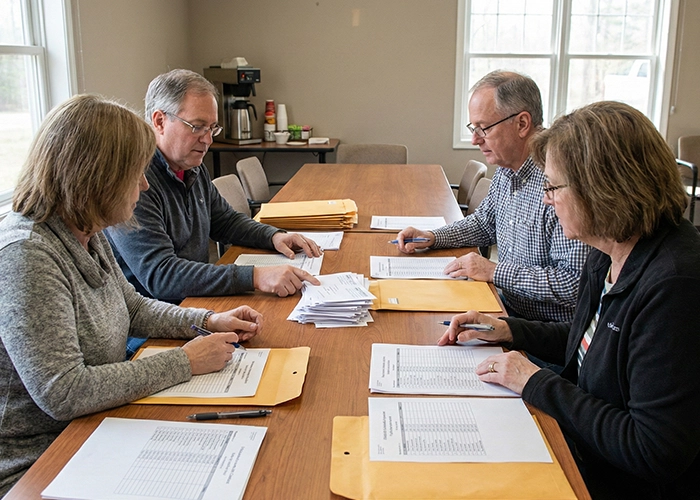Alabama HOA Laws: A Guide to Homeowners’ Rights and HOA Powers

Homeowners associations are increasingly common in residential communities across Alabama. These associations play a vital role in maintaining shared spaces and ensuring harmony through community rules and regulations. To function legally and effectively, communities must comply with both federal and Alabama HOA laws.
Browse By Category
Sign up for Our Newsletter
Homeowners associations are increasingly common in residential communities across Alabama. These associations play a vital role in maintaining shared spaces and ensuring harmony through community rules and regulations. To function legally and effectively, communities must comply with both federal and Alabama HOA laws.
Key Alabama HOA Laws You Should Know About
Here are some of the most crucial laws you need to familiarize yourself with in Alabama.
Alabama Homeowners Association Act (2015)
Effective January 1, 2016, Alabama’s Homeowner’s Association Act governs homeowners associations created after that date. Existing HOAs can opt in by amending their governing documents. The law sets requirements for association formation, governance, meetings, disclosures, and the resolution of disputes.
Some of the main points from this law include:
- Requires HOAs formed after 2016 to be incorporated as nonprofit corporations.
- Mandates disclosures to buyers about HOA membership, assessments, and governing documents.
- Includes provisions for rule enforcement, board responsibilities, and records access.
Alabama Uniform Condominium Act (1991)
Applies to condominiums created on or after January 1, 1991. The state’s Uniform Condominium Act outlines development procedures, unit owner rights, and association responsibilities. It also regulates budgeting, insurance, maintenance obligations, and voting rights.
Some sections, particularly those regarding governance and enforcement, may apply retroactively to older condominiums unless their governing documents state otherwise.
Alabama Condominium Act (pre-1991)
Not to be confused with the previous act, the Alabama Condominium Act applies to condominium projects established before January 1, 1991. While similar in scope to the Uniform Condominium Act, it lacks some of the modern protections and procedural requirements found in the newer law.
Alabama Nonprofit Corporation Law
Most HOAs in the state are nonprofit corporations. Another Alabama HOA law that covers this is the state’s Nonprofit Corporation Law. It governs their corporate structure, including board composition, elections, recordkeeping, and dissolution procedures. It also dictates how HOAs conduct meetings and handle financial disclosures.
Alabama Fair Housing Law
Mirroring the federal Fair Housing Act, Alabama’s Fair Housing Law prohibits housing discrimination based on race, color, religion, sex, national origin, familial status, or disability. HOAs must ensure that their covenants, rules, and enforcement practices comply with these protections.
HOA Formation and Incorporation
All HOAs established after 2016 must be incorporated as nonprofit corporations under Alabama law. Incorporation requires filing Articles of Incorporation with the Secretary of State and drafting bylaws outlining board structure, meeting rules, and voting procedures.
Older HOAs that are not incorporated may not enjoy the same legal protections and could face more complex legal hurdles in enforcement or litigation.
HOA Membership: Mandatory vs Voluntary
HOA membership in Alabama depends on whether the community’s governing documents (like the declaration of covenants) make membership a requirement.
- Mandatory membership means every homeowner automatically joins the HOA when they purchase property in the community. They must pay dues and follow the rules.
- Voluntary membership allows homeowners to choose whether to join, usually seen in older or less formally organized communities.
Governing documents such as the Declaration of Covenants, Conditions & Restrictions (CC&Rs) will specify whether membership is mandatory.
HOA Rules and Enforcement

HOAs have the authority to create and enforce community rules as long as they are consistent with state law and the association’s governing documents.
Fines and Penalties
Before imposing fines, Alabama law requires the HOA to provide:
- Written notice of the alleged violation
- An opportunity for a hearing
Fines must also be reasonable and proportionate, and outlined in the association’s rules or bylaws. Some restrictions, such as a complete ban on American flags, are unenforceable due to federal laws like the Freedom to Display the American Flag Act.
Financial Powers: Assessments, Budgets, and Records
Alabama HOAs have the power to:
- Charge assessments to fund the maintenance of common areas.
- Impose late fees and interest for nonpayment, as outlined in the governing documents.
- Adopt annual budgets, which must be disclosed to members.
Under the Homeowners Association Act, HOAs must maintain records of financial transactions, meeting minutes, governing documents, and membership rosters. Homeowners are generally entitled to access these records upon written request.
Liens and Foreclosure
Local laws also offer regulations when it comes to placing liens and starting foreclosure proceedings.
Placing a Lien
If a homeowner fails to pay dues, the HOA may file a lien against the property. Before doing so, it must:
- Notify the homeowner in writing.
- Allow time to cure the delinquency.
Once a lien is in place, the property cannot be sold or refinanced until the debt is cleared.
Foreclosure Process
If dues remain unpaid, Alabama law allows the HOA to foreclose the lien, either through judicial or non-judicial proceedings, depending on the terms in the governing documents. Foreclosure results in the sale of the property, with proceeds used to pay the debt.
Note: Foreclosure should be a last resort. Many associations work with homeowners on payment plans before pursuing legal action.
Can an HOA Evict a Homeowner?
No. HOAs in Alabama do not have the legal authority to evict a homeowner. However, they can initiate foreclosure proceedings to collect unpaid dues or fines. In cases involving tenants (e.g., rental properties), the HOA may have limited authority under the governing documents to enforce lease restrictions or initiate eviction via court process.
Alabama HOA Laws: Terminating an HOA
Dissolving an HOA is a complex process governed by the Nonprofit Corporation Law and the HOA’s bylaws. In general, the process involves:
- Board Resolution: Adoption of a resolution to dissolve.
- Membership Vote: Typically requires approval by at least two-thirds of members.
- Debt Settlement: All outstanding debts and obligations must be resolved.
- Asset Distribution: Any remaining assets must be distributed in accordance with the bylaws.
- Articles of Dissolution: Filed with the Alabama Secretary of State.
Once the dissolution is complete, the HOA ceases to exist and no longer enforces rules or collects dues.
Alabama HOA Laws: Homeowner Rights

Both state and federal laws govern what rights a homeowner should have in any community. Here are some that you should note:
Right to Access Records and HOA Documents
Homeowners have the legal right to request and inspect financial and governance records. This includes:
- Meeting minutes
- Budgets
- Governing documents
- Board decisions
The association may charge a reasonable fee for copies.
Right to Participate in Governance
Homeowners have the right to:
- Vote in board elections
- Attend open meetings
- Serve on committees or run for board positions
Board meetings should be open to members, except when discussing confidential matters (e.g., legal issues).
Right to Fair Treatment
Homeowners are entitled to equal treatment under the law. HOAs must enforce rules uniformly and without discrimination, in compliance with federal and state fair housing laws.
Right to Install or Access Satellite Dishes and Antennas
HOAs cannot prohibit the use of satellite dishes or certain antennas under the OTARD Rule, a federal regulation that protects homeowners’ rights to receive broadcast signals.
Dispute Resolution and Legal Assistance
Disputes between homeowners and the HOA are common, especially around rule enforcement, dues, or architectural changes. While the Alabama HOA Act doesn’t mandate mediation or arbitration, many associations include such processes in their governing documents.
When in doubt, both board members and homeowners should consult:
- A licensed attorney
- A professional Alabama HOA management company
These experts can ensure compliance with Alabama law and help navigate complex disputes.
HOA Compliance in Alabama
Alabama’s HOA laws provide a robust framework for managing communities and protecting homeowners. However, legal interpretations and procedures can be nuanced. Both boards and homeowners should familiarise themselves with applicable state statutes and governing documents, and seek professional advice when necessary.
Related Articles:
- HOA Lien: Understanding Its Impact and How to Avoid It
- Are Daycare Services In HOA Communities Allowed?
- HOA Budget Best Practices Every Board Member Should Know
Trending Now
Related Article
Sign up for Our Monthly Newsletter
Sign up below for monthly updates on all HOA Resource















